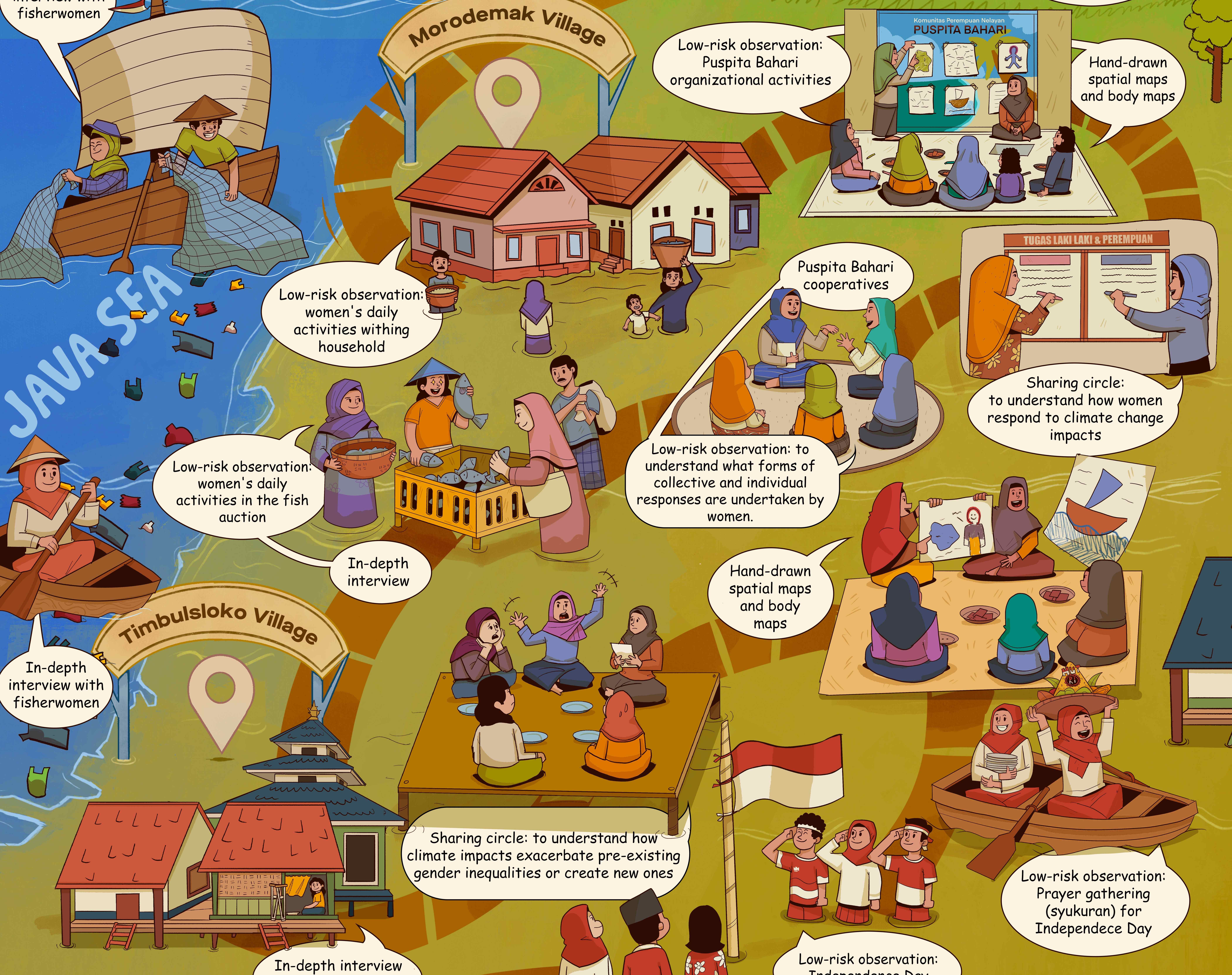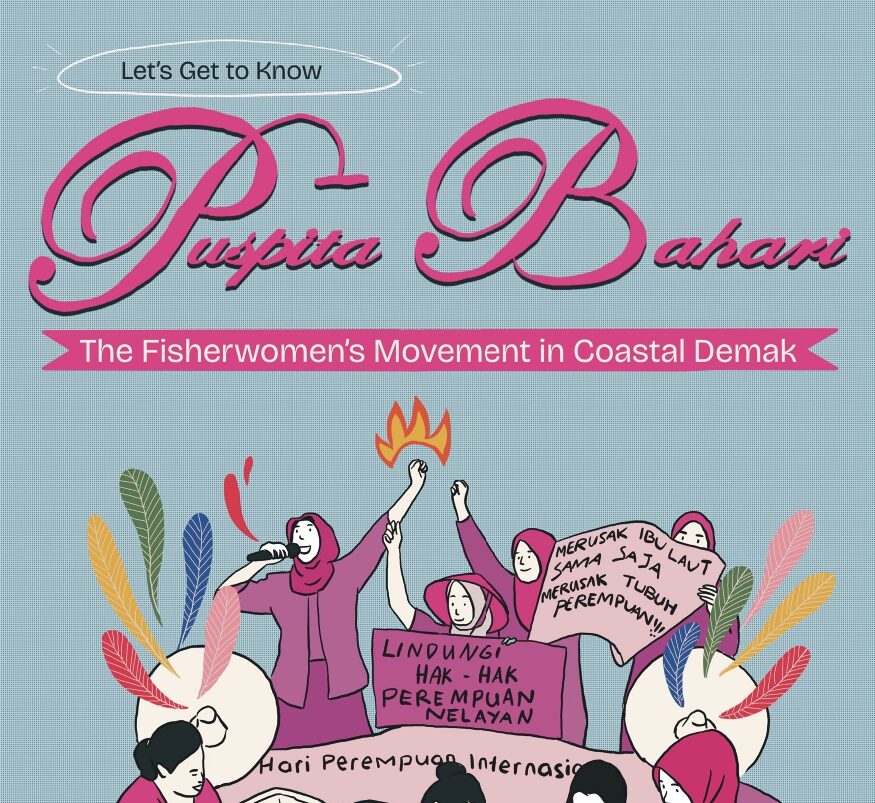GENERATE Project collaborate with Puspita Bahari, a fisherwomen’s movement in Indonesia to discuss the intersectional impacts of tidal flooding on women and formulate cross-sectoral strategies.
Andi Misbahul Pratiwi (PhD Student, School of Geography, University of Leeds), Puspita Bahari – the fisherwomen’s movement in Demak, and Dr. Katie McQuaid (Associate Professor of Gender and Climate, University of Leeds), worked together to hold the festival “Women Weaving Movements to Respond to the Climate Crisis” on 25th September 2024, in Demak Regency, West Java Province, Indonesia.
This event aimed to urge the government to pay attention to the urgent issue of tidal flooding, which has a particularly severe impact on women, girls, older people, and people with diffabilities. The festival served as a space to demonstrate fisherwomen’s strength and resilience in facing climate change through local initiatives, positioning Puspita Bahari as an agent of change and a model for best practices.

The festival was attended by over 120 participants from various sectors, including government officials, civil society organizations, human rights activists, and academics. The event featured public dialogues, expert panels, poem reading, a photo exhibition, a fishing gear exhibition, dancing, a traditional market, legal aid consultations, as well as film screenings and discussions.
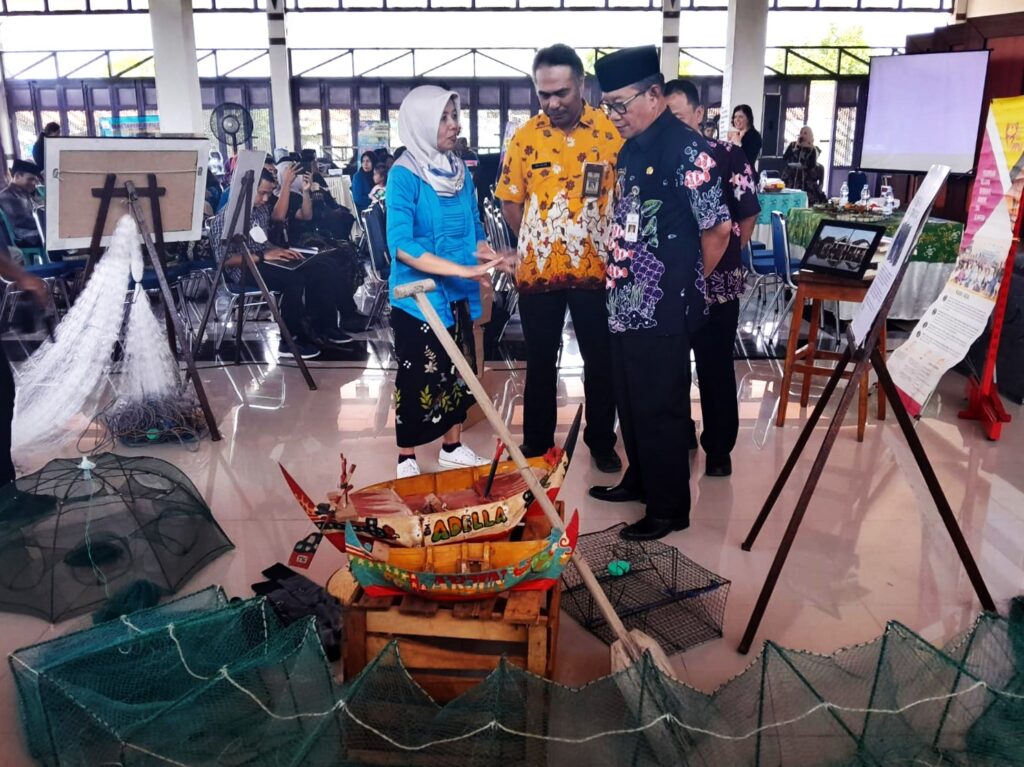
Gender and Tidal Floods in the North Coast of Central Java
The rise in global sea levels, extractive development, and neglect of coastal and marine ecosystem restoration have turned tidal flooding in the northern coast of Java from a seasonal event into an everyday disaster.
Coastal villages have experienced erosion since the 1990s, and gradually tidal flooding has begun to submerge rice fields, roads, and residents’ homes.
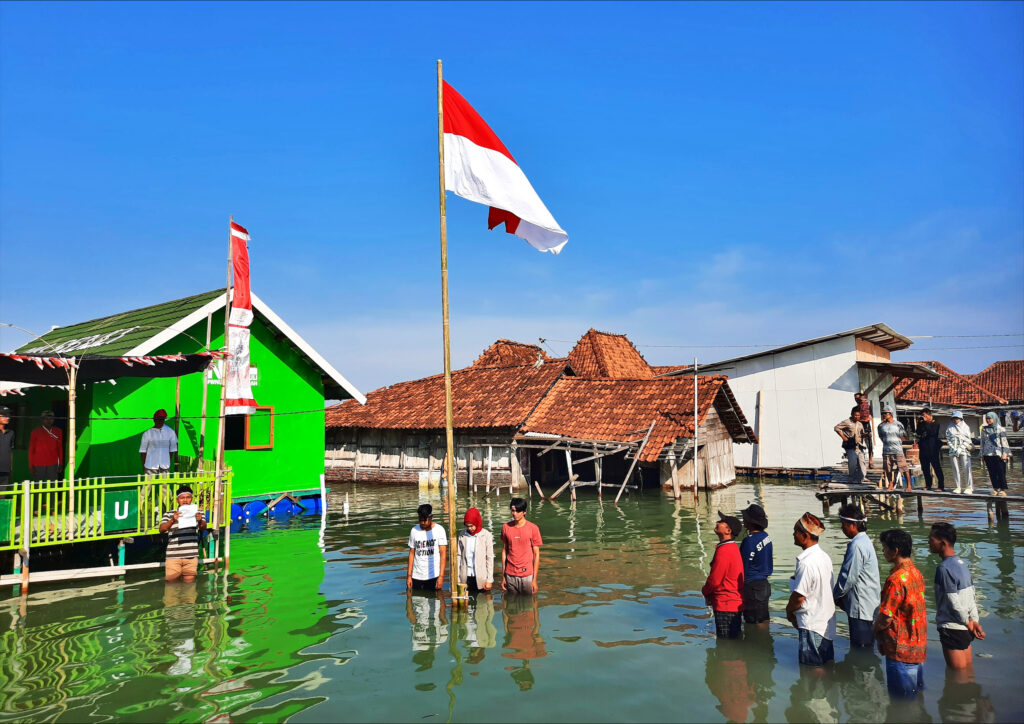
This cumulative disaster has resulted in decreased income and worsened health conditions for coastal communities. Some have migrated in search of new living spaces. However, many residents remain.
Staying amidst the encroaching disaster and sinking land is not an easy choice. Climate change disproportionately impacts women, children, people with diffabilities, elders, indigenous communities, and other vulnerable groups, placing many at increased risk of Gender-Based Violence (GBV).
The Puspita Bahari Movement
Puspita Bahari, a community of fisherwomen in Demak Regency, was established in 2005 with a mission to empower the economic standing of fisherwomen, helping them overcome marginalisation and break free from the chains of patriarchal culture.
Puspita Bahari emerged as an oasis amidst the strong patriarchal culture in coastal communities and the hegemonic masculinity that dominates the fisher’s movement.
In Demak, reflecting broader Javanese cultural norms, women are not positioned as leaders. Poverty and violence against women are rooted in a cultural perspective that relegates women to the role of Konco Wingking (a companion behind) with the duties of Macak (dressing up), Masak (cooking), and Manak (giving birth). These values render women’s voices, positions, and leadership invisible and unheard.
Amidst the tidal floods that hit coastal villages, Puspita Bahari continues to move forward by establishing cooperatives, producing reusable cloth menstrual pads, supporting victims of gender-based violence, advocating fisherwomen’s rights and aspirations, and helping flood-affected communities to adapt.

Masnu’ah, the head of Puspita Bahari, in her speech at the festival opening, stated that women in the coastal villages of Demak Regency, such as Morodemak, Margolinduk, Purworejo, Timbulsloko, and Bedono, are experiencing severe impacts of tidal flooding.
“When tidal flooding occurs, women bear multiple burdens, such as cleaning the house, taking care of children, and at the same time, serving as the family’s breadwinners as fishers,” Masnu’ah said.
Until now, fisherwomen have yet to experience real benefits from social protection programmes for fishers and are still invisible in climate change policies and agendas: “We hope the government will take the climate crisis more seriously and stop offering false solutions to the community,” Masnu’ah added.
Feminist Participatory (Creative) Action Research
Andi Misbahul Pratiwi, a doctoral student at the University of Leeds, explained that the festival is part of a seven-month Feminist Participatory Action Research (FPAR) conducted in coastal villages in Demak Regency, Indonesia. Her research involved 38 fisherwomen and adopted creative methods, such as hand-drawing spatial maps and body mapping, to understand their embodied experiences and agency amid the climate crisis.

Through this research, Andi positioned fisherwomen not only as research subjects but also as agents of change. The festival is a manifestation of the research findings, with Puspita Bahari taking the lead in advocating against and responding to the climate crisis. The festival also launched a book co-created in a collaboration between Puspita Bahari and the GENERATE project at the University of Leeds. The illustrated book presents a collection of stories about tidal floods, serving as a tool for the community to share and communicate their experiences.
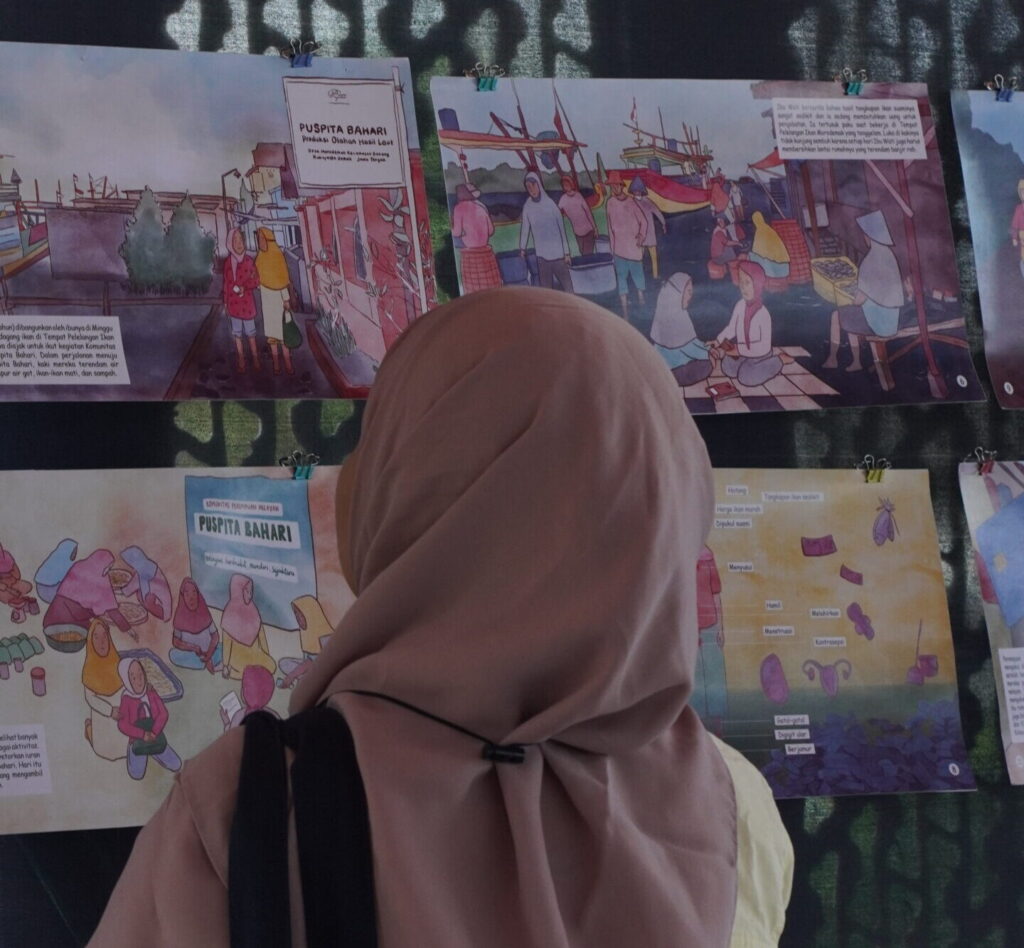
“During my fieldwork, I was greatly helped and inspired by the fisherwomen who were very open in sharing their stories. Storytelling is also part of their adaptation to the climate crisis; it is their way of self-advocacy and a form of everyday resistance,” Andi explained.
Dr. Katie McQuaid, Associate Professor of Gender and Climate at the University of Leeds, UK, who leads the GENERATE project, explained the importance of combining action research with arts to bridge the gap between communities and policymakers:
“GENERATE focuses primarily on marginalized groups, such as refugees, people with diffabilities, older people, informal workers, women and girls, indigenous communities, and sexual minorities, who experience layered and different impacts from the climate crisis,” Katie explained.
She emphasized the importance of conducting research through an intersectional lens, led by the affected communities themselves so that their diverse stories and experiences can be represented by them.
“I had the opportunity to visit the fish auction and sinking village in Demak, and I saw firsthand how women, with their diverse identities—fishers, elders, people with diffabilities—are on the frontlines, bearing the burden of the climate crisis,” Katie stated.
Building Inclusive Dialogue and Encounters
The festival included two panel discussions related to fisherwomen and the climate crisis. The first panel discussion, titled “Climate Crisis and the Livelihoods of Fisherwomen,” featured Siti Darwati (a fisherwoman from Purworejo Village), Rusikah (a woman from Timbulsloko Village), the Demak Regency Environmental Agency, the Demak Regency Fisheries and Marine Agency, and the People’s Coalition for Fisheries Justice. Additionally, a representative from the National Commission on Disabilities was present, highlighting the issues faced by women with disabilities amidst the climate crisis.

The discussion revealed that tidal flooding is still not considered an urgent disaster in coastal areas, despite fisherwomen stating that it has affected every aspect of their lives, including their economy, physical and mental health, gender-based violence, and family relationships. Furthermore, social protection programmes have yet to reach fisherwomen and women with diffabilities remain invisible and left behind.
The second panel discussion, titled “Gender-Based Violence and the Climate Crisis,” included speakers such as Hidayah (a victim advocate from Puspita Bahari and a fisherwoman from Morodemak Village), a commissioner from the National Commission on Violence Against Women (Komnas Perempuan), and representatives from the Demak Regency Office of Social Affairs and Women’s Empowerment and Child Protection.
The second panel found that tidal flooding increases the rates of violence against women and hampers access to justice for victims and their advocates. Unfortunately, women’s empowerment programmes have not yet incorporated the climate crisis as a key factor.
The discussions concluded with a call for urgent attention from local governments to address the impacts of the climate crisis and tidal flooding on women, emphasizing the importance of collaboration between affected communities in tackling this issue. The festival ended with a call to the public to pay greater attention to the impact of tidal flooding and to support the initiatives of fisherwomen’s communities.

